Projects
For over three decades, Literacy.org has provided leadership in research, development, and training in the field of literacy, with a focus on adult basic education and international literacy and development. We have completed a variety of major projects, contracts, grants, and events on time and within budget. We invite you to explore our projects below (in alphabetical order).
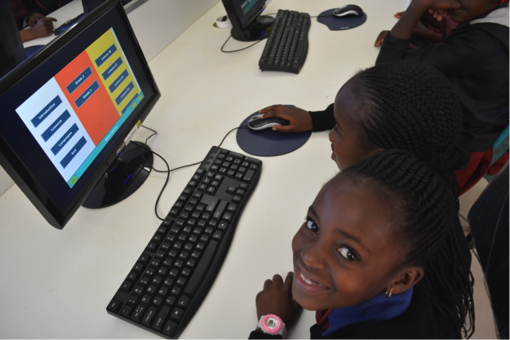
Bridges to the Future Initiative™
Bridges to the Future Initiative (BFI) addresses the digital divide of education and technology in emerging economies by improving literacy, basic education, and technological literacy, thereby assisting the world's poorest peoples to better determine their own social and economic future. With funding from multilateral agencies and private foundations (including the World Bank, USAID, Kellogg Foundation and J.P. Morgan Foundation), BFI has invested predominantly in India (Andhra Pradesh state) and South Africa (Limpopo Province), to improve reading in children youth and adults with multi-lingual software. The BFI focuses on assisting poor, disadvantaged, and marginalized children, youth and adults in developing countries to take advantage of new information and communications technologies (ICTs) for improving basic literacy and technological literacy skills as a means to participate in the global information and economic marketplace. A selection of videos about the BFI project can be found on our media page. The ILI was a recipient of the 2015 UNESCO Confucius International Literacy Prize for the BFI-South Africa project.
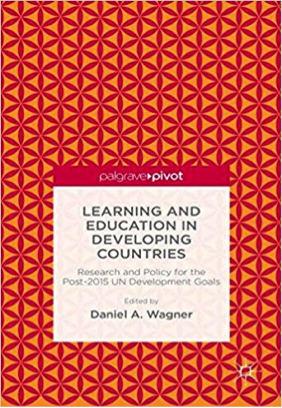
Global Taskforce on Learning Research
The Global Learning Task Force (GLTF) was established by the Brookings Institution Center for Universal Education at ILI from 2010-2014 to inform the next learning goals of the UN Sustainable Development Goals. Composed of 16 top global specialists, and with input from many others, the GLTF produced a major working paper for Brookings entitled Learning First: A Research Agenda for Improving Learning in Low-Income Countries. In addition, a major edited volume with full findings was produced: Wagner, D. A. (Ed.). (2014). Learning and Education In Developing Countries: Research and Policy for the Post-2015 UN Development Goals. NY: Palgrave Macmillan.
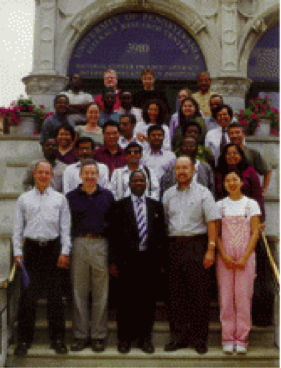
ILI Summer Literacy Training Program (SLTP), Philadelphia
The SLTP program was open to mid-career professionals as well as younger specialists involved in literacy work in developing countries. The program included several weeks of training, workshops and seminars, and a number of informative visits to local literacy centers and institutions. Topics included literacy policy and planning, child and family literacy development, literacy assessment and evaluation, informal and distance education, literacy innovations, and the use of technology. While the SLTP is no longer running, some of the materials found on this page will be of assistance to others who wish to run literacy training programs.
Learning at the Bottom of the Pyramid 2: Applying Research to Policy and Practice
The Second Conference on Learning at the Bottom of the Pyramid (LBOP2), held in late 2020 via Zoom webinar, explored and documented the tensions in understanding and promoting learning among marginalized populations in low-income countries. Serious debates continue around science, measurement, and policy related to learning in these groups, particularly at a time of important global shifts in urbanization, migration, and demography. The LBOP2 conference built on the earlier work in the book Learning at the Bottom of the Pyramid (Wagner, D. A., Wolf, S., & Boruch, R., Eds., 2018), highlighting that there is a critical need to focus on learning among the poor and marginalized in order to adequately address social and economic inequalities in the future.
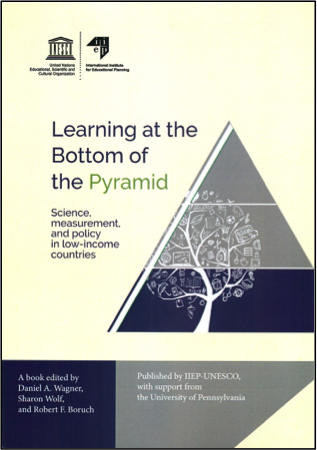

Learning at the Bottom of the Pyramid
The 2030 United Nations Sustainable Development Goals place a high priority on the quality of education—and on learning. This growth in interest and support of children’s learning has raised acute challenges, especially with respect to poor and marginalized children—those at the bottom of the pyramid. Because the scientific community has as yet invested only modest effort in understanding learning differences among poor children in disadvantaged communities in low-income countries, the purpose of this volume is to expand the conversation. The premise is that focusing on average country-level performance (typically the main interest of international agencies in achieving the UN goals) often leaves out those who face the most barriers to accessing education and learning. The aim is to bring greater attention to reducing learning inequalities within countries, as a way increase equity, as well as to raise national learning levels. In this volume, diverse international experts analyze the scientific tensions in understanding and supporting learning among children at the bottom of the pyramid. An edited book from the conference, entitled Learning at the Bottom of the Pyramid: Science, Measurement and Policy in Low-income Countries, was published in 2018 by UNESCO-IIEP.
Learning Connections
Without the foundation of basic skills, neither access to nor success in higher education–or, for that matter, in employment or other aspects of adult life–is possible for the estimated 40 million illiterate and low-literate adults nationwide. With the support of Lumina Foundation for Education, Literacy.org is addressing this social and economic challenge. Through a web-based platform accessible to low-literate learners, Learning Connections facilitates individualized self-advising as both a motivational and directional tool, offering career advice, encouraging basic and post-secondary education, and providing progress tracking tools and instant feedback rewards. By providing a flexible, context-sensitive tool to help learners identify pathways and potential outcomes, Learning Connections helps individual learners aspire beyond basic skills, and empowers them to make their own choices and understand the impact of those choices on career and educational aspirations and opportunities. Future work on this project is being taking up by initiative called Project Literacy, https://www.projectliteracy.com, under the supervision of Proliteracy, a non-profit organization.
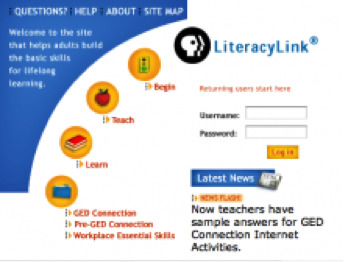
LiteracyLink™
With funding through the U.S. Department of Education and in partnership with PBS Adult Learning Service, Kentucky Educational Television, and the Kentucky Department of Education, Literacy.org (and NCAL) led the development team to create an integrated learning system using online, video, and print media to provide instruction, assessment, and teacher training for GED and workforce preparation skills for adult learners. LiteracyLink delivers instruction for adult learners in GED preparation and Workplace Essential Skills, offers training in instructional and technology issues, and crafts an individual learning plan for each participant. It also provides professional development opportunities and resources for adult educators and administrators. To access LiteracyLink, go to: litlink.ket.org
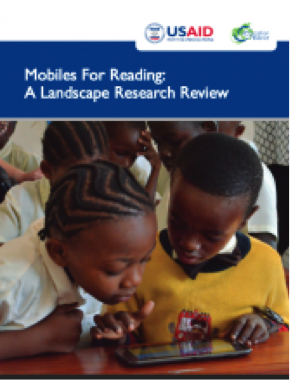
Mobiles for Reading
In 2014, the ILI was commissioned to undertake a review of current projects by the United States Agency for International Development (USAID) on behalf of its support for the Mobiles for Education (mEducation) Alliance (www.meducationalliance.org) and the All Children Reading: A Grand Challenge for Development (ACR GCD) (www.allchildrenreading.org). This review was led by a group of faculty and students, with support from USAID staff and additional outside experts. The report, by D. A. Wagner et al., may be downloaded here: Mobiles for Reading: A Landscape Research Review.
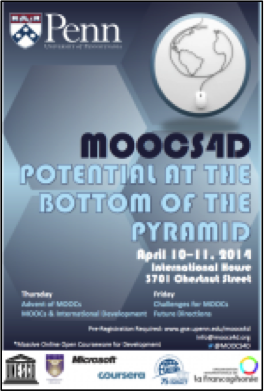
MOOCs for Development
The MOOCs4D International Invitational Conference, held in April 2014, brought together scholars, policymakers, program officers, administrators, and technologists from the education and international development sectors. The main goal was to better understand the dynamics surrounding this situation and deliberate on solutions and action plans that will enable MOOCs to serve the development needs of resource-poor communities of learners – those at the "bottom of the pyramid." The initiative was co-sponsored by the Office of the Provost of the University of Pennsylvania, Annenberg School for Communication, School of Engineering and Applied Science, Perelman School of Medicine, School of Nursing, The Wharton School and Penn Libraries. Additional support provided by Microsoft, Coursera, United Nations Educational Scientific Cultural Organization (UNESCO), International Council for Open and Distance Education, Organisation International de la Francophonie, and Commonwealth of Learning.
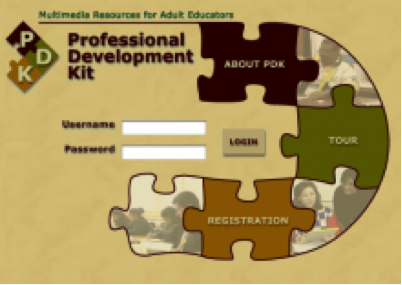
Professional Development Kit (PDK): Multimedia Resources for Instructional Decision-Making
Professional Development Kit (PDK) was funded by the U.S Department of Education in collaboration with SRI, International, to create professional development tools for adult educators. Employing case-based instruction in the context of facilitated adult education teacher professional development, PDK can help adult educators explore and develop their practice in new ways and investigate new materials and strategies for instruction. With video case studies of adult education classrooms, online tools for practitioners to structure their own cases, resources that include a knowledge database, digests, portfolio, group discussion, and class products, and staff development and user guides, PDK provides resources and a framework to support participants’ efforts to generate questions and brainstorm solutions to challenging professional situations. PDK is available on CD-ROM, and some of its tools may be accessed online at Literacy.org. A selection of videos from PDK is available on our media page.
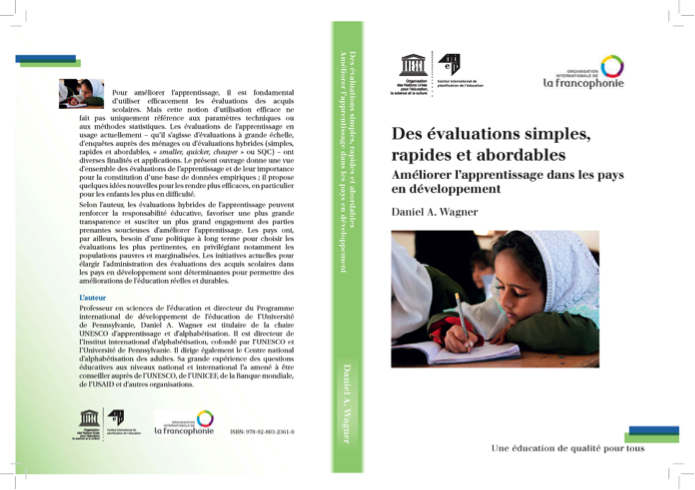
Smaller, Quicker, Cheaper: Improving Learning Assessments for Developing Countries
The SQC project was a collaboration between IIEP (UNESCO) and ILI, funded by the Fast Track Initiative (now GPE)/World Bank to review and synthesize a set of policy options for assessment methods of basic skills learning in developing countries. The review focuses on school-aged children (5-12 years), but also considered out-of-school children, youth, and adults. It included an inventory of key indicators and learning measurement methodologies (especially reading assessment) that have been used over the past decade and up to the present (including on-going projects). Costs and benefits were seen in terms of fiscal investments and policy outcomes, time to completion, size and nature of human resources inputs, technical complexity, and other aspects of the assessment burden. The review began in 2009 and was published here by UNESCO in 2011. A French language edition was also produced: Des évaluations simples, rapides et abordables: Améliorer l’apprentissage dans les pays en développement. IIEP-UNESCO.
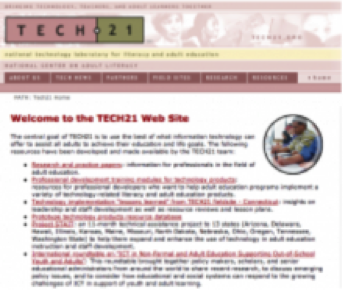
TECH21: National Technology Laboratory for Adult Education
TECH21 was a decades-long effort, funded initially by the U.S. Department of Education’s OVAE to develop IT tools to assist adults in achieving their adult education and life goals. Through collaboration with direct services providers and online systems, TECH21 provided a hands-on and virtual research-to-practice and dissemination system, developing state-of-the-art technology learning environments that enabled those learning and working in practice-based adult education settings to access technology and fully integrate it into their practice. The follow-up to TECH21 may be seen in other projects at Literacy.org.



 © COPYRIGHT 2025
© COPYRIGHT 2025